
Given its West Coast premiere at the Elephant Theatre Company, "The Little Flower of East Orange," written by Stephen Adly Guirgis, directed by David Fofi, begins and ends with Danny, a writer manqué, getting the story of his mother off his chest. Whether or not this catharsis has set him free -- he's still in prison, though he's made his confession -- remains to be seen. What is clear is this: in an era of discredited priests, apostasy and religious fundamentalism, what the world needs is a good old saint; miracles not required. And that's what we get in this splendid production though, among other things, the story's not so much a deconstruction of saints or even a hagiography as the difficulty of living with one.
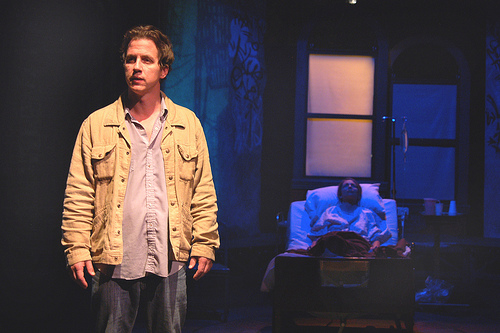
The story begins with an unconscious woman, Therese Marie (Melanie Jones), being gurnied into a hospital. She was found outside the Cloisters, in a coma, in a wheelchair, on the brink of death. She has no identification, which doesn't mean as much to Dr. Shankar (Mark Adair-Rios) as it does to Detective Baker (Tim Starks). She hallucinates, thinking that Baker is Jimmy Stewart, that David Halzig (Tom Stanczyk), the son of another patient in the room, is Bobby Kennedy. As it happens, she's not about to die, though that intelligence, falsely planted, gets her to reveal the names of her children. A frantic (and very funny) phone call from Justina (Marisa O'Brien) to her brother Danny (Michael Friedman), in addiction rehab, in Arizona, finds him in flagrante delicto with fellow addict, Nadine (Kate Huffman), the daughter of a Senator. He scurries cross-country, nubile Nadine in tow, to his mother's bedside. And the rest of the production recounts how a latter-day saint gets built, from the ground up: not from the deeds but the narration.
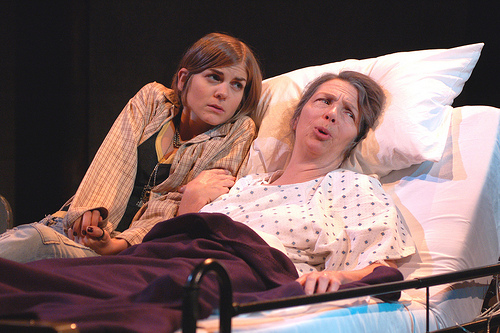
Visual contrasts set the tone for a story that takes place for the most part in a hospital room. As would be expected, the rooms are sparse, which nicely accomodates people with other kinds of baggage. So does the bleak, impersonal room set against passionate and heated exchanges between a mother and her two high-spirited (to put it mildly) children. The bed is set at a 45-degree angle, which befits a story with no right angles; nothing is clean-cut, black or white but, rather black and white, which is gray. Nothing's seen head-on, which is how the story is presented. The past doesn't intrude as much as it's always there, as seen in the person of Therese Marie's father, Francis James (Timothy McNeil), who skulks about the room, invisible to everyone but Marie Therese, like the Ghost of Hamlet's Father. The clever use of lights and the presence of an unseen person behind a curtain make the place seen like a confessional in a church.
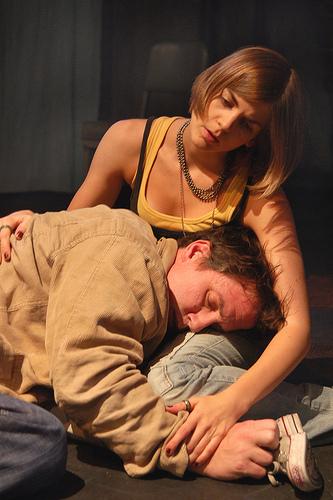
As the story unfurls, we learn that Therese Marie has a secret that concerns her brilliant, mute Father. It's not a diabolical one and, after its build up, its revelation comes across as an anti-climax, though it did have far-reaching consequences. Though she may have thwarted the regular beatings her father heaped upon her mother and sister, no one thwarted him from turning his mute fury on her. Her children knew about it; that knowledge is presumably what led Danny to a life of dissolution and Justine to channel her life through an aggressive, controlled life in Chicago. In fact, it's as though Danny, the narrator, wants us to know the secret. Why? To show us that, as commendable as Therese Marie's reluctance to admonish her father out of respect for the dead, it nonetheless impacted her children, especially him. He wants to admire her grace but can't, won't bear its cost. It's not a pretty story but, over time, the rough edges would presumably smoothen, after which time she becomes rightly so, the Little Flower of East Orange. She's not yet a saint but my, isn't she saintly?
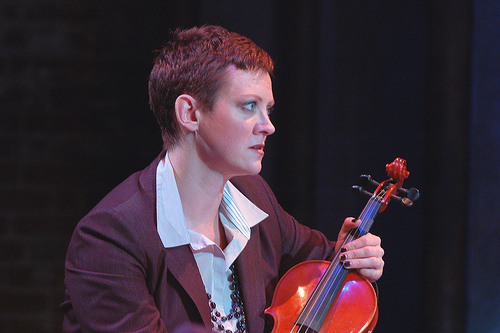
Guirgis has created characters that palpitate and suffer, characters with whom we identify. We all know someone like Therese Marie. In an evening of spectacular performances, Jones's Therese Marie is the most memorable. Because she's raw, vulnerable, a physical wreck, and emotionally frazzled, it's hard to tell if she's cross-bearing pious or just passive and weak. The distinction frustrated us and it certainly frustrated her children. Either bedridden or else in a wheelchair, Jones' character doesn't move around much but, with a radiance that is due as much to her facial expressions as the lighting, she seems to hover above the stage. Radiance-wise as well, the more enraged her children became, the more illuminating she became, as if she were the flame of a votive candle and they were the errant moths. Jones remarkably made Therese Marie's forgiveness the source of both her strength and her weakness.
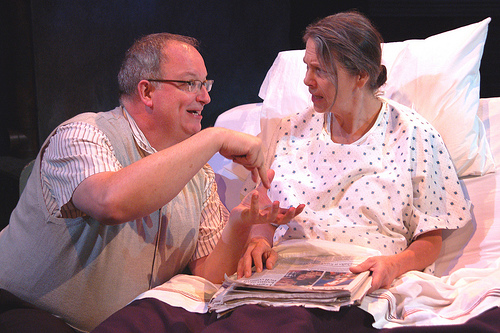
Unlike the stationary Therese Marie, Friedman's Danny was all over the place, literally (from Arizona to New Jersey) and emotionally (frenetic, erratic, and violent). He fidgets, he moves around, wildly agitated. The only time he seems to relax, ironically, is at the end when, having told us his story, he gets handcuffed and let back to his jail cell. His shoulders slump, his voice loses its rough edge, as if he's said his piece and now he's going to serve his penance. Guirgis has left underdeveloped the nature, the quality, and the success of Danny's writing. But it plays out in the different registers that the production's dialogue takes, as if he's channeling all the different characters through his confessional writer's voice. It's an effective trope, and very well done. O'Brien's Justine deals with the fallout in a very different way than her brother. While Danny's like a balloon that finally deflates, Justine maintains a steady, strident pitch. The most touching scene of the production showed her at her unconscious mother's bedside. She plays the violin while, at the same time, yells that, if she died, she wouldn't bury her.
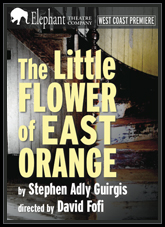
The production rings fierce and it rings true. It resonates because it's messy and bittersweet, just like life. Because there's no clear-cut resolution, just candles that go out, just like life. And, because it's just like life, you love and you hate the characters, usually at the same time.
Performances are 8 PM, Friday and Saturday, 7 PM, Sunday. The play runs until December 19. Tickets are $25 - $30. The Theatre is located at 1076 Lillian Way, Hollywood. For more information call (877) 369-9112 or visit www.elephanttheatrecompany.com.
